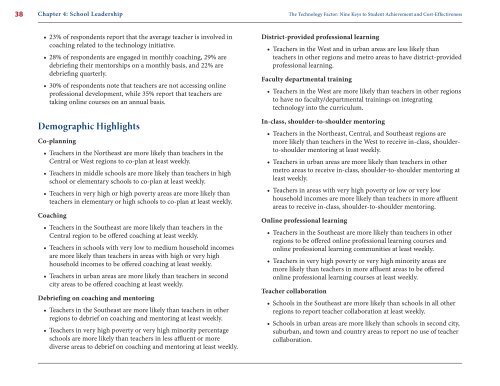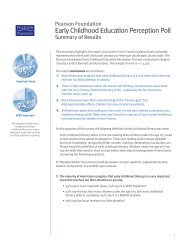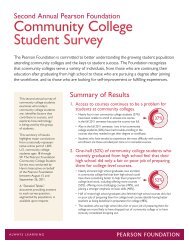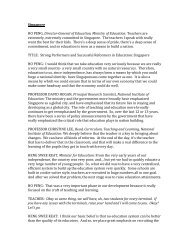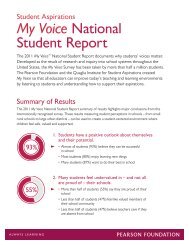The Technology Factor: Nine Keys to Student Achievement and Cost ...
The Technology Factor: Nine Keys to Student Achievement and Cost ...
The Technology Factor: Nine Keys to Student Achievement and Cost ...
Create successful ePaper yourself
Turn your PDF publications into a flip-book with our unique Google optimized e-Paper software.
38<br />
Chapter 4: School Leadership <strong>The</strong> <strong>Technology</strong> <strong>Fac<strong>to</strong>r</strong>: <strong>Nine</strong> <strong>Keys</strong> <strong>to</strong> <strong>Student</strong> <strong>Achievement</strong> <strong>and</strong> <strong>Cost</strong>-Effectiveness<br />
• 23% of respondents report that the average teacher is involved in<br />
coaching related <strong>to</strong> the technology initiative.<br />
• 28% of respondents are engaged in monthly coaching, 29% are<br />
debriefing their men<strong>to</strong>rships on a monthly basis, <strong>and</strong> 22% are<br />
debriefing quarterly.<br />
• 30% of respondents note that teachers are not accessing online<br />
professional development, while 35% report that teachers are<br />
taking online courses on an annual basis.<br />
Demographic Highlights<br />
Co-planning<br />
• Teachers in the Northeast are more likely than teachers in the<br />
Central or West regions <strong>to</strong> co-plan at least weekly.<br />
• Teachers in middle schools are more likely than teachers in high<br />
school or elementary schools <strong>to</strong> co-plan at least weekly.<br />
• Teachers in very high or high poverty areas are more likely than<br />
teachers in elementary or high schools <strong>to</strong> co-plan at least weekly.<br />
Coaching<br />
• Teachers in the Southeast are more likely than teachers in the<br />
Central region <strong>to</strong> be offered coaching at least weekly.<br />
• Teachers in schools with very low <strong>to</strong> medium household incomes<br />
are more likely than teachers in areas with high or very high<br />
household incomes <strong>to</strong> be offered coaching at least weekly.<br />
• Teachers in urban areas are more likely than teachers in second<br />
city areas <strong>to</strong> be offered coaching at least weekly.<br />
Debriefing on coaching <strong>and</strong> men<strong>to</strong>ring<br />
• Teachers in the Southeast are more likely than teachers in other<br />
regions <strong>to</strong> debrief on coaching <strong>and</strong> men<strong>to</strong>ring at least weekly.<br />
• Teachers in very high poverty or very high minority percentage<br />
schools are more likely than teachers in less affluent or more<br />
diverse areas <strong>to</strong> debrief on coaching <strong>and</strong> men<strong>to</strong>ring at least weekly.<br />
District-provided professional learning<br />
• Teachers in the West <strong>and</strong> in urban areas are less likely than<br />
teachers in other regions <strong>and</strong> metro areas <strong>to</strong> have district-provided<br />
professional learning.<br />
Faculty departmental training<br />
• Teachers in the West are more likely than teachers in other regions<br />
<strong>to</strong> have no faculty/departmental trainings on integrating<br />
technology in<strong>to</strong> the curriculum.<br />
In-class, shoulder-<strong>to</strong>-shoulder men<strong>to</strong>ring<br />
• Teachers in the Northeast, Central, <strong>and</strong> Southeast regions are<br />
more likely than teachers in the West <strong>to</strong> receive in-class, shoulder<strong>to</strong>-shoulder<br />
men<strong>to</strong>ring at least weekly.<br />
• Teachers in urban areas are more likely than teachers in other<br />
metro areas <strong>to</strong> receive in-class, shoulder-<strong>to</strong>-shoulder men<strong>to</strong>ring at<br />
least weekly.<br />
• Teachers in areas with very high poverty or low or very low<br />
household incomes are more likely than teachers in more affluent<br />
areas <strong>to</strong> receive in-class, shoulder-<strong>to</strong>-shoulder men<strong>to</strong>ring.<br />
Online professional learning<br />
• Teachers in the Southeast are more likely than teachers in other<br />
regions <strong>to</strong> be offered online professional learning courses <strong>and</strong><br />
online professional learning communities at least weekly.<br />
• Teachers in very high poverty or very high minority areas are<br />
more likely than teachers in more affluent areas <strong>to</strong> be offered<br />
online professional learning courses at least weekly.<br />
Teacher collaboration<br />
• Schools in the Southeast are more likely than schools in all other<br />
regions <strong>to</strong> report teacher collaboration at least weekly.<br />
• Schools in urban areas are more likely than schools in second city,<br />
suburban, <strong>and</strong> <strong>to</strong>wn <strong>and</strong> country areas <strong>to</strong> report no use of teacher<br />
collaboration.


